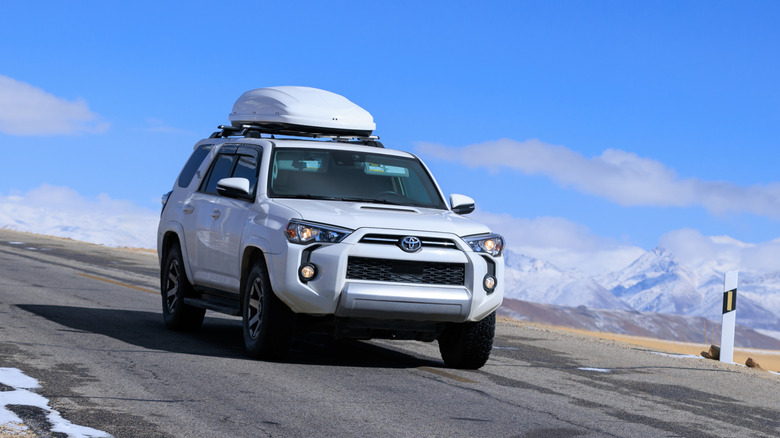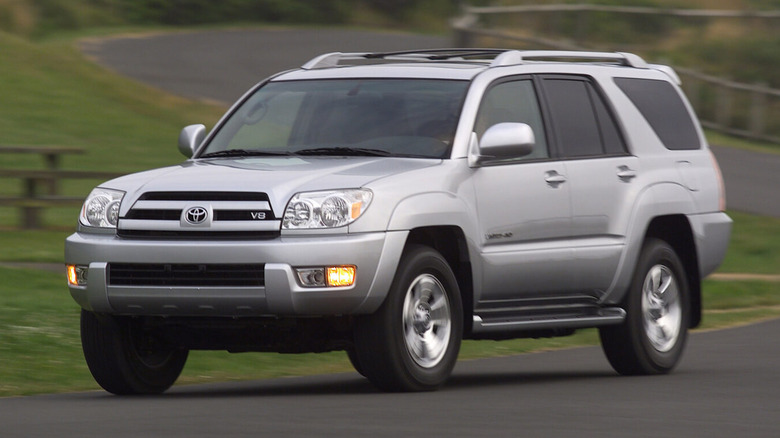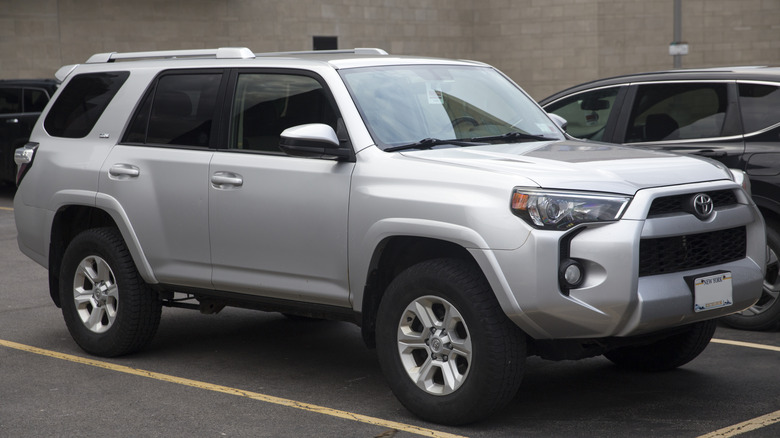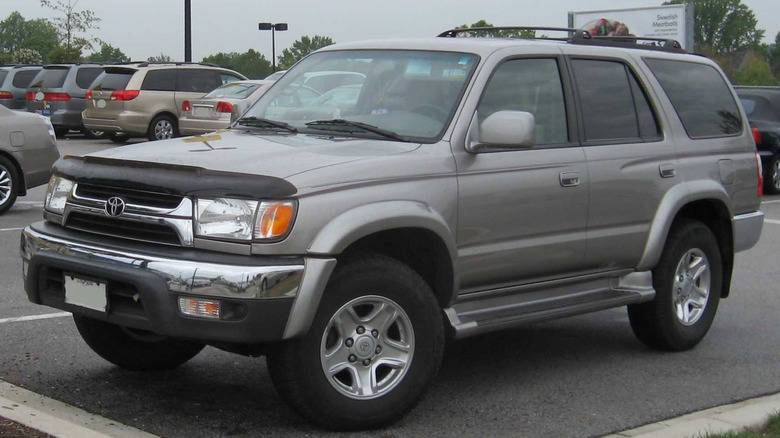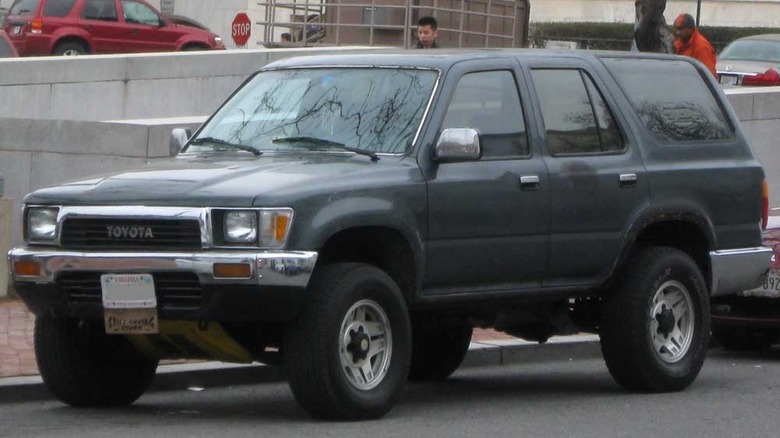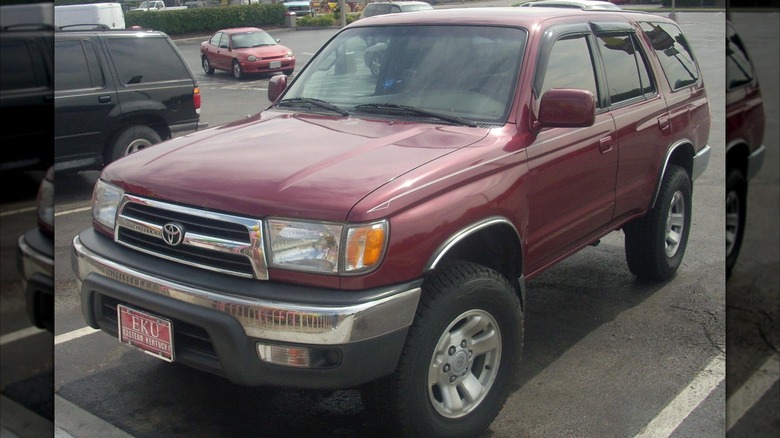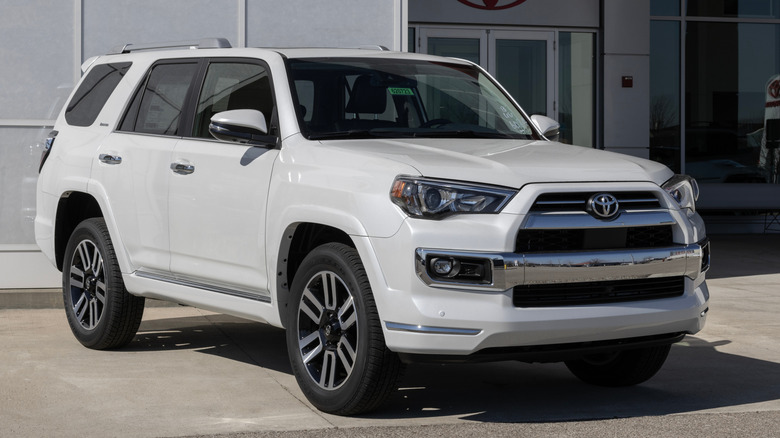5 Toyota 4Runner Years To Never Buy Used
Toyota is known as one of the most reliable carmakers in the world. The Japanese company has been making cars in the United States since 1957, and many of its models have been incredibly successful. For instance, the Corolla is the best-selling passenger car in the world, with more than 50 million units sold since its debut in 1966. Another iconic model is the Toyota 4Runner, which has been in production for over 40 years.
The 4Runner came to fruition after Toyota halted the import of the Land Cruiser FJ40 to the U.S. After the success of the Toyota Trekker — a car built by Winnebago Industries and Toyota — the company saw potential for an off-road-capable domestic truck. This idea gave birth to the 4Runner in 1984.
Currently, in its sixth-generation, the Toyota 4Runner comes with all the bells and whistles you would expect from an SUV. However, if you want to buy a used 4Runner, not all year models are advisable for purchase. To help you make a smarter decision, we have created this guide that covers the used 4Runner years to avoid.
Fourth Generation (2003-08)
The Toyota 4Runner models from 2003 to 2009 make up the fourth generation, and are widely considered among the worst. According to CarComplaints, every year from 2003 to 2008 has been plagued with issues, the most common problem being the severe rusting on the car frame. Head over to Reddit, and you'll find plenty of owners complaining about rust formation underneath the body. To prevent their 4Runner from deteriorating before the engine gives out, some owners have also suggested a rust-proof coating.
Between 2003 and 2008, each model year of the Toyota 4Runner was recalled by the National Highway Traffic Safety Administration (NHTSA) more than twice, affecting millions of vehicles. Beyond the problem of rust, the fourth-generation Toyota 4Runner is also known to have issues such as dashboard cracking, suspension issues, brake failures, engine and transmission issues — all of which leave a dent in the pocket and make the ownership of 4Runners from this generation expensive.
The 2003 model alone has over 800 complaints on CarComplaints, while the 2004 model is even worse, with 937 complaints registered by owners. Although the number of issues began to decline starting with the 2005 model, the figures remain high enough, making this generation of used 4Runners a problematic purchase. If you really want a used 4Runner from the fourth generation — since it was the only generation to offer the 4Runner with a V8 engine — try getting a well-inspected 2009 model.
Fifth Generation (2013-16)
4Runner models from 2010 to 2024 come under the fifth generation, and while this generation is considered a reliable one, models from 2013 to 2016 are infamous for several issues. Speaking of the 2013 model, some of the major issues you'll find mentioned on CarComplaints include brake failures, engine issues, electrical component problems, suspension issues, body paint issues, fuel system issues, faulty airbags, and mileage issues. Poor fuel economy is a particularly troubling issue for this generation of 4Runners, thanks to poor aerodynamics, a heavy build, and an outdated transmission.
According to NHTSA, the 2013 4Runner was recalled six times, making it a highly unreliable used 4Runner model to purchase. As for the 2014, 2015, and 2016 models, all have over 100 complaints according to CarComplaints. If you want a used 4Runner from these years, be vigilant about inspecting the suspension, electrical components, body rust, infotainment system, engine mechanical noises, and airbag system. 4Runners from 2014 to 2016 have the highest number of recalls by NHTSA. The 2014 model was part of seven recalls from the company, whereas the 2015 and 2016 models were recalled nine and eight times, respectively.
There are several forums filled with owner complaints about the problems they are facing with the fifth-generation Toyota 4Runner. Those eyeing a used 4Runner from the fifth generation can opt for a newer model to avoid spending money on repairs.
Third Generation (1999-02)
The third-generation 4Runner debuted in 1996 and stayed in production until 2002. With this generation, Toyota completely redesigned the car, and finally ditched the chassis and other parts of the Hilux. Instead, Toyota introduced the Land Cruiser Prado's chassis, which also brought new powertrain options. While the third-generation Toyota 4Runner is considered legendary, there are a few years that you should be careful about. The 1999 model is associated with 327 complaints at CarComplaints and has been a part of two official recalls by NHTSA. Most of the issues were related to body paint problems, rusting, AC/heater problems, electrical problems, and transmission problems.
As for the 2000, 2001, and 2002 models, the 4Runner has over 1,000 complaints in total. Body rust has been a common problem for all Toyota 4Runners, and it is the same for this generation as well, a bit of a serious issue, though. As per NHTSA, the 2000, 2001, and 2002 4Runner models were recalled two, three, and two times, respectively. Based on the available information, the 4Runner models from 2000 to 2002 suffered from unreliable frame quality and were also plagued with suspension, automatic transmission, and engine fluid leakage, among other problems.
You should inspect the third-generation Toyota 4Runner thoroughly to get a better idea of repairs versus replacement. This will help you understand if a third-generation used 4Runner is worthy or not.
Second Generation (1990-95)
While you may not see a huge number of complaints for the second-generation Toyota 4Runner from 1990 to 1995, upon checking multiple forums, several issues pop up. Online, owners complain of big problems with the head gaskets on the 3.0-liter V6 engine –- a critical component used to avoid coolant or engine oil leakage to cylinders. Some report that even after replacing the head gasket several times, it would continue to go off, even with regular maintenance, suggesting a flaw in the engine design.
Per forum posts, problems such as oil leakage, electrical component failure, and lack of power are all concerns with the second-generation Toyota 4Runner, especially from 1990 to 1995. The 1995 4Runner has four recalls and 184 complaints registered at NHTSA, making it the worst among the lot. The recalls were for dimly lit reflectors and steering rod issues. All other models have been recalled 2-3 times, with the 1994 model being recalled four times, for the same issues as the 1995 model.
The second generation also suffered from sagging rear suspension issues, power steering problems, timing chain issues, oil leaks, and several other problems. If you really want a second-generation used 4Runner, then you should try looking for a 1991 or a 1995 model.
First Generation (1988-99)
The Toyota 4Runner debuted in 1984, and four years into its production, the 1988 and 1999 4Runner models are known to be full of issues and should be avoided if available in the used car market. The reason? Similar to other 3.0-liter engine problems, the first-generation 4Runner also suffered from head gasket problems. The 3.0-liter engine is also cursed by owners of the 4Runners for its low power output. For context, the first-generation Toyota 4Runner came with 2.4-liter inline-4 and 3.0-liter V6 engine options. Neither produced enough grunt to pull a 3-ton truck.
The 3.0-liter engine has been termed a "crap shoot" by owners because of several reports of engine seizures and head gasket failure. The 2.4-liter engine is more desirable between the two, but it comes with a power sacrifice, though the company did add a turbo to the 22R-E, boosting the power output from almost 100 hp to 135 hp. Apart from the poor engine performance, the first-generation Toyota 4Runner appears to have suffered from the same issues as the later generations, with body rust, poor paint quality, and faulty suspension being some of the major issues.
Timing chain wear and oil leakage, thanks to a problematic gasket, have also been among the glaring issues of the first-generation 4Runner.
Methodology
To compile this list, we gathered information from multiple trusted sources, including RealTruck, CarComplaints, and several owner forums. Each 4Runner model was also carefully reviewed to check for recurring issues, design flaws, and mechanical weakness. Model years with high volumes of complaints and major issues, as reported by owners, expert websites, and recalls by the NHTSA, have been listed as the Toyota 4Runner models to avoid.
